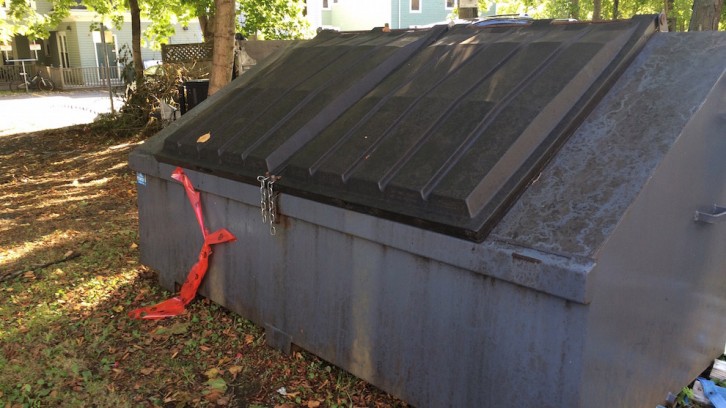Garbage
Dalhousie aims to get ‘ahead of the curb’ on new garbage rules
Halifax's new garbage bag bylaws don't affect Dalhousie, but they're making changes anyway

caption
All outdoor dumpsters will be removed from Dalhousie's Halifax campuses in the coming weeks.
caption
All outdoor dumpsters will be removed from Dalhousie’s Halifax campuses in the coming weeks.As Halifax households become accustomed to the new garbage rules that went into effect over the summer, Dalhousie University residence staff is having to adapt as well.
Although institutions such as Dalhousie are not required to follow the new rules — clear bags instead of opaque black ones for garbage — just yet, the school has begun to implement them in residences and across the rest of their Halifax campuses. In the coming weeks, outdoor dumpsters across the grounds will be done away with as well.
“We’re kind of getting there. It’s been a big move for us in residence,” said Mateo Yorke, the facilities manager of a number of Dalhousie residences, of the shift. “We are in a big transition.”
Currently those big dumpsters are picked up by trucks operated by Royal Environmental Group and taken directly to the landfill in Otter Lake. Soon the school’s contract with them will end and trash will be picked up by two custodians from its building of origin and taken to Dal’s own sorting station near Coburg Road and Oxford Street. There, waste will be sorted, compacted and sent on its final journey to the Otter Lake facility.
Yorke says that even when garbage is sorted correctly inside a building, once it goes into an outside dumpster there is a risk that a passerby will taint it by dropping their own improperly sorted trash inside. When that happens, the municipality can reject the whole dumpster when it arrives at the landfill and give the school a hefty fine.
In its recently published Solid Waste Management Plan, Dalhousie states that it hopes to keep 65 per cent of its compostable and recyclable waste out of landfills by 2016; 70 per cent by 2020.
“Everything is just going to gradually come on stream the weekend that the dumpsters go away…that will be the big test,” said Yorke. “It’s going to be dramatic, but we’re going to be having everybody ready from our end.”
Dalhousie residence buildings use a different system than the rest of the city already. Trash is sorted into six categories – paper, refundables, recyclables, organics, glass, and garbage, rather than the usual three — garbage, recyclables and organics. Called the PRROGG system, every garbage room in a residence has labels and bins for each one. Broken glass is stored in a cardboard box.
Citywide, the municipality says the new bagging system is going well. Tiffany Chase, a senior communications adviser at the Halifax Regional Municipality’s public affairs office, says collectors and facility operators have reported fewer garbage bags at the curb, and an increase in recycling overall. She says that the city’s new garbage app has helped Haligonians out too. The Signal has previously reported on it.
“The new system makes good financial sense for us and for taxpayers. It costs quite a bit of money to process material at our landfill and to process that same material at our recycling plant and our organics facility is much cheaper,” says Chase. “And also of course we get a bit of revenue from selling that material as well.”
The more garbage that is properly recycled, the less rapidly the landfill will have to expand, says Chase. And recycling is good for the planet, too.

